Here are the links to Prof. Alcenat’s two most recent media appearances:
Category Archives: Faculty News
Prof. Westenley Alcenat Makes Media Appearances on Scope & TRT World.
Comments Off on Prof. Westenley Alcenat Makes Media Appearances on Scope & TRT World.
Filed under Faculty News
In Memoriam the Victims of the El Paso Massacre, August 3, 2019
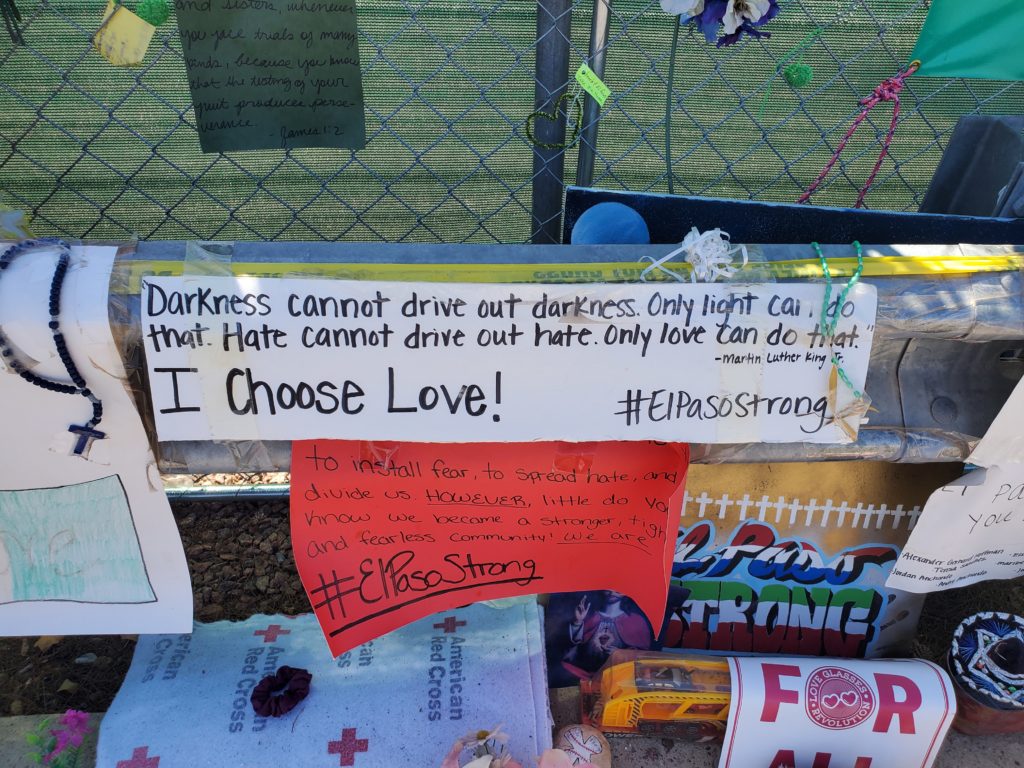
On Saturday, August 3, 2019, in El Paso, Texas, a 21 year old white male brandishing a semi-automatic rifle walked into a Walmart known to be popular with Americans and a convenient destination for Mexicans crossing the nearby border for their weekly shopping excursion into the United States. He began to shoot, deliberately targeting people of apparent Mexican and Latin American descent. Twenty three people died in the shooting (the last dying in April of 2020), and another twenty three were injured. News organizations identified the dead as thirteen United States Americans, eight Mexicans, and one German citizen. A deeper look, though, reveals that of the thirteen Americans killed, eleven were of Latinx descent. As a result, the El Paso Walmart shooting was the worst mass murder of Latino people in modern American history.
The murderer has been identified as a white supremacist with a deep hatred of Latinos, someone who consumed white supremacist literature and wrote a manifesto at the time of the shooting. This is not a surprise, as in the last five years the United States also has suffered mass shootings of African Americans (Charleston, June 17, 2015) and Jews (October 27, 2018). In his manifesto, the shooter argued that Mexicans specifically, and Latinxs generally, are invading the United States, taking jobs away from U.S. citizens, and endangering the white majority populace. This rhetoric reveals anti-Latinx sentiments with roots deep in United States history. It also calls attention to the historical and continuous race-based and structural violence that affects minority communities in the U.S. and at the border.
Father McShane has suggested that the Fordham community commemorate and discuss these tragedies in November. For now, though, it is important to mourn the victims of August 3 and to remember how and why they died:
Andre Anchondo, 23
Jordan Anchondo, 24
Arturo Benavides, 60
Leonard Cipeda Campos, 41
Angelina Englisbee, 86
Maria Flores, 77
Raul Flores, 77
Guillermo Garcia, 36
Jorge Calvillo García, 61
Maribel Hernandez, 56
Adolfo Cerros Hernandez, 68
Alexander Gerhard Hoffman, 66
David Alvah Johnson, 63
Luis Alfonso Juarez, 90
Ivan Hilierto Manzano, 46
Gloria Irma Marquez
Elsa Mendoza Márquez, 57
Margie Reckard, 63
Sara Esther Regalado, 66
Javier Rodriguez, 15
María Eugenia Legarreta Rothe, 58
Teresa Sánchez de Freitas, 82
Juan Velázquez, 77
Father McShane asked the University Church to offer the Sunday (August 2) Mass on behalf of the victims and the El Paso community, an appropriate gesture for a community and a people very serious about their religious faith.
For our part, we mourn the dead and summon the living to reflect on what we can do to support our own communities. The El Paso Museum of History will display a digital memorial in remembrance of August 3. The public can join virtually by submitting pictures and memories on Digital El Paso at http://www.digie.org. We invite you to take part and encourage everyone to become active in supporting some of those organizations working on behalf of our communities in El Paso, the Southwest, and in New York. We can best honor the dead by fighting for and supporting justice at home and around the nation:
Local
Central American Legal Assistance: https://www.centralamericanlegal.info/
Latino Pride Center: http://www.latinopridecenter.org/
Casita Maria Center for Arts and Education https://www.casitamaria.org/
St. Jerome H.A.N.D.S Community Center: https://jeromehands.com/
Texas
In El Paso, Annunciation House, which has worked to house and support migrants and refugees on the border:: https://annunciationhouse.org/
Raices Texas: The Refugee and Immigrant Center for Education and Legal Services https://www.raicestexas.org/ways-to-give/donate/
Border Network for Human Rights: https://bnhr.org/about/history/
National
The Young Center for Immigrant Children’s Rights: https://www.theyoungcenter.org/
The National Day Laborer Organizing Network: https://ndlon.org/
United We Dream: https://unitedwedream.org/
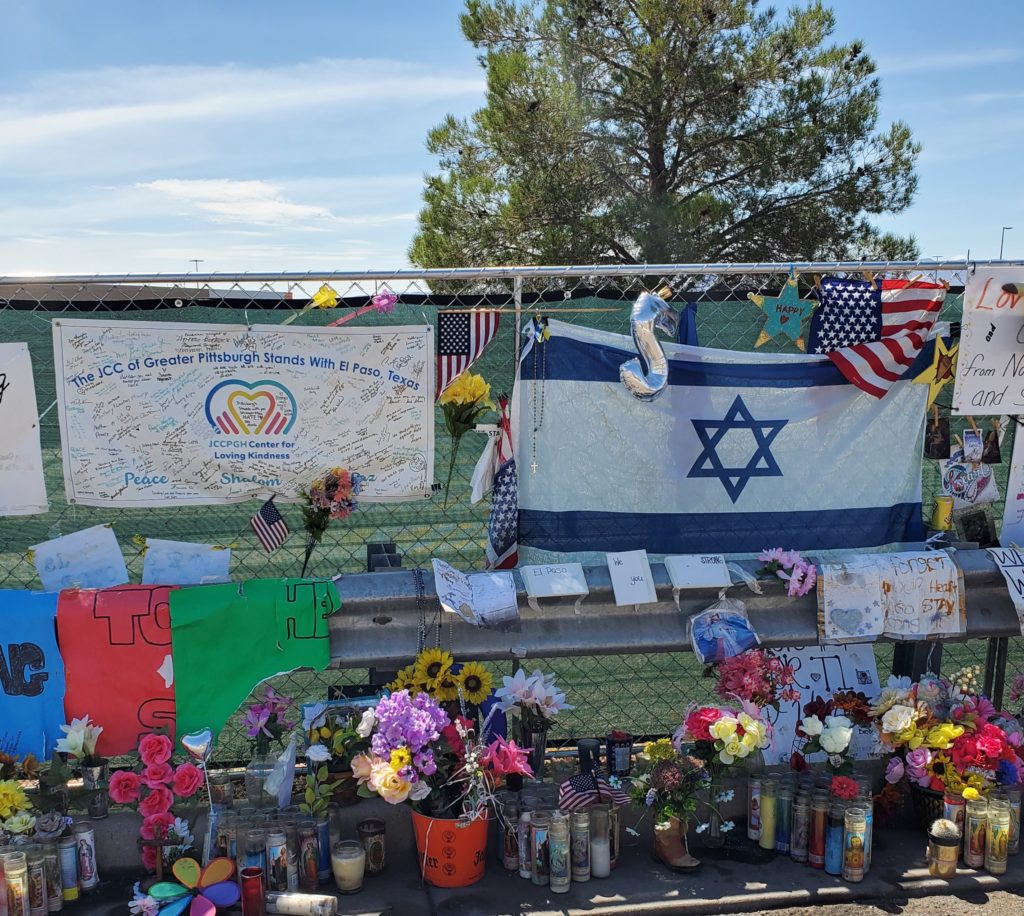
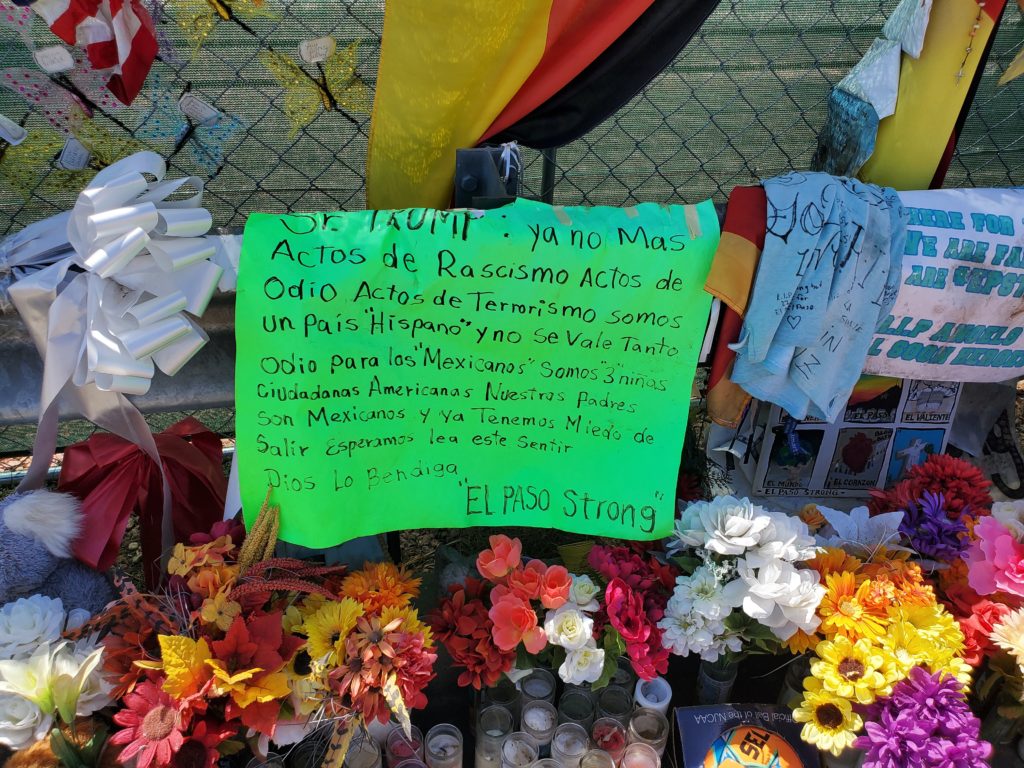
In solidarity,
David Myers and Stephanie Huezo (with help from William Hogue)
Comments Off on In Memoriam the Victims of the El Paso Massacre, August 3, 2019
Filed under Faculty News, Faculty Profiles, In Memoriam
Professor Christopher Maginn Publishes “Teaching the World of Queen Elizabeth I in the Age of SARS CoV-19” in The Sixteenth Century Journal.
On July 7, 2020, Professor Christopher Maginn has just published an article in a special Early Modern Classroom supplement (2020) devoted to teaching in the era of COVID-19. Below is a link to the piece. Someone may find its discussion of pedagogy useful.
You can read the piece on this link: https://www.escj.org/blog/teaching-world-queen-elizabeth-i-age-sars-cov-19.html
Comments Off on Professor Christopher Maginn Publishes “Teaching the World of Queen Elizabeth I in the Age of SARS CoV-19” in The Sixteenth Century Journal.
Filed under Faculty News, Faculty Profiles, Faculty Profiles, Fordham News, Global History, Public History, Publications, Teaching
Professor Nana Osei-Opare published “When It Comes to America’s Race Issues, Russia Is a Bogeyman” in Foreign Policy Magazine.
On July 6, 2020, Fordham history Professor Nana Osei-Opare published an op-ed piece in Foreign Policy Magazine called, “When It Comes to America’s Race Issues, Russia Is a Bogeyman.”
You can read the piece on this link: https://foreignpolicy.com/2020/07/06/when-it-comes-to-americas-race-issues-russia-is-a-bogeyman/
You can follow him on Twitter @NanaOseiOpare.
Comments Off on Professor Nana Osei-Opare published “When It Comes to America’s Race Issues, Russia Is a Bogeyman” in Foreign Policy Magazine.
Filed under Faculty News, Faculty Profiles, Faculty Profiles, Global History, Public History, Publications
Professor Westenley Alcenat Published “Black Lives and the Fourth of July” in The Nation.
On July 3, 2020, Fordham history Professor Westenley Alcenat published an op-ed piece in The Nation called, ““Black Lives and the Fourth of July.”
You can read the piece on this link: https://www.thenation.com/article/society/juneteenth-independence-day/
Comments Off on Professor Westenley Alcenat Published “Black Lives and the Fourth of July” in The Nation.
Filed under Faculty News, Faculty Profiles, Faculty Profiles, Public History
Former Fordham History Professor Carina E. Ray published “Could the Police Kill Me, Too?’ My Young Son Asked Me” in The New York Times.
On June 20, 2020, former Fordham history Professor Carina Rey, now at Brandeis University, published an op-ed piece in The New York Times called, “”Could the Police Kill Me, Too?’” You can read the piece on this link: https://nyti.ms/2Bma1UL
Comments Off on Former Fordham History Professor Carina E. Ray published “Could the Police Kill Me, Too?’ My Young Son Asked Me” in The New York Times.
Filed under Alumni News, Faculty News, Faculty Profiles, Fordham News
Professor Nana Osei-Opare published “Around the world, the U.S. has long been a symbol of anti-black racism” in The Washington Post.
On June 5, 2020, Professor Nana Osei-Opare published, “Around the world, the U.S. has long been a symbol of anti-black racism,” in The Washington Post. You can read it by clicking the link below: https://www.washingtonpost.com/outlook/2020/06/05/around-world-us-has-long-been-symbol-anti-black-racism/
You can follow him on Twitter @NanaOseiOpare.
Comments Off on Professor Nana Osei-Opare published “Around the world, the U.S. has long been a symbol of anti-black racism” in The Washington Post.
Filed under Faculty News, Faculty Profiles, Fordham News, Global History, Public History, Publications
Prof. S. Elizabeth Penry’s Book, “The People Are King: The Making of an Indigenous Andean Politics,” Awarded the 2020 Flora Tristán Prize
We are excited to announce that the Peru Section of the Latin American Studies Association has awarded Prof. S. Elizabeth Penry’s new book, The People Are King: The Making of an Indigenous Andean Politics (Oxford University Press, 2019), the 2020 Flora Tristán Prize for the best book on Peru published in the previous year.
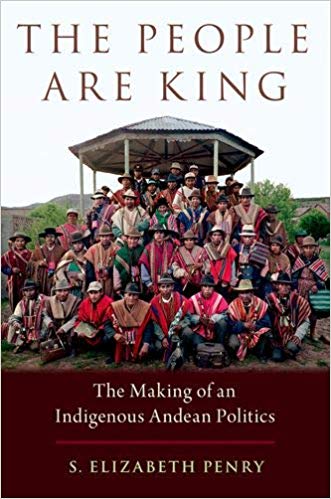
Comments Off on Prof. S. Elizabeth Penry’s Book, “The People Are King: The Making of an Indigenous Andean Politics,” Awarded the 2020 Flora Tristán Prize
Filed under book history, Faculty Awards, Faculty News, Faculty Profiles
Professor Yuko Miki Receives Prestigious American Council of Learned Societies (ACLS) Award
The American Council of Learned Societies (ACLS) announced that Prof. Yuko Miki is one of its 2020 cohort Fellows. The “ACLS Fellowship program honors scholars in the humanities and humanistic social sciences who have the potential to make significant contributions to knowledge in their fields.”
Yuko Miki’s project is entitled, “Emancipation’s Shadow: Stories of Illegal Slavery.” This project is a narrative history of illegal slavery in the nineteenth-century Atlantic World. Through four intertwined stories, it investigates how illegal slavery thrived throughout the Atlantic World in general, and in Brazil in particular, in the very midst of the “Age of Emancipation.” Attention to the lived experiences of women, men, and children forced into, or who profited from, illegal slavery challenges the predominant history of the nineteenth-century as a period marked by the triumph of abolition and freedom. Drawing on literary analysis and archival ethnography, this project asks how illegal slavery can critique these liberal, modernizing narratives that have been foundational to the study of slavery and abolition, and Atlantic world history more broadly.
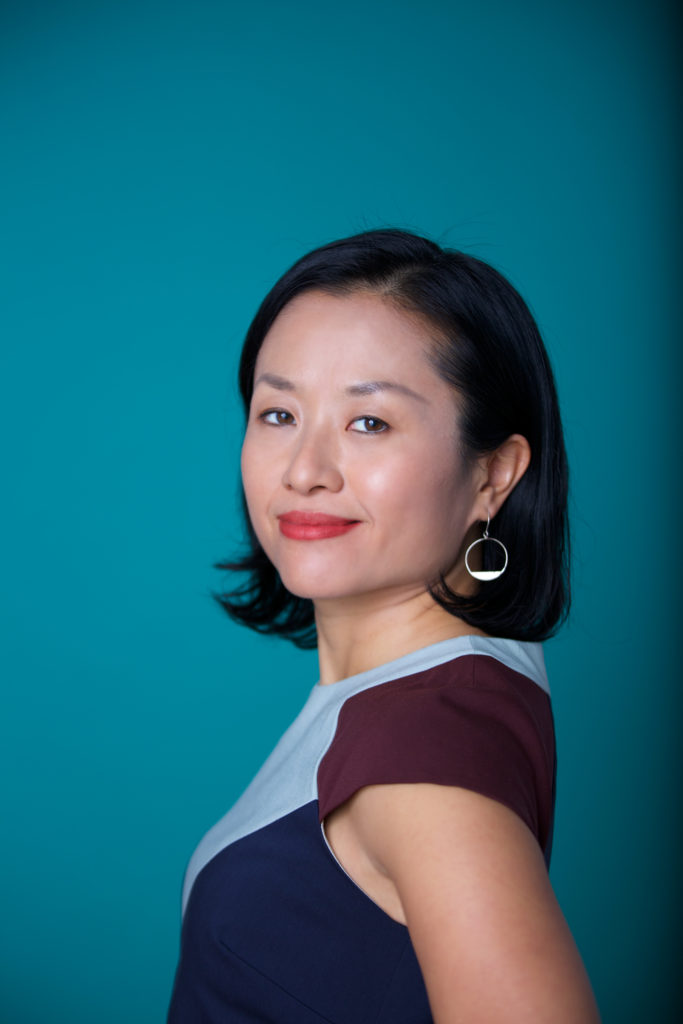
Comments Off on Professor Yuko Miki Receives Prestigious American Council of Learned Societies (ACLS) Award
Filed under Faculty Awards, Faculty News, Faculty Profiles, Global History
Professor Osei-Opare Featured in The Fordham Ram Article, “Professor Exposes Students to Truths of African History.”
Joergen Ostensen’s article, “Professor Exposes Students to Truths of African History,” is reproduced below:
The office of Nana Osei-Opare, assistant professor of history at Fordham University, is filled with books, and somewhere on the shelves, although not immediately at hand, he said there is a copy of “Long Walk to Freedom,” the autobiography Nelson Mandela wrote while imprisoned on Robben Island. In the book, Mandela explains his decision to abandon non-violence for the armed resistance to apartheid that made him a political prisoner for 27 years.
Mandela’s process of becoming a revolutionary is the kind of history Osei-Opare said he is trying to keep alive in his classes.
This year, his first at Fordham, he is teaching mostly freshmen, in a course called African History that fulfills the university’s Understanding Historical Change requirement. He said one of his main goals is to dispel the ahistorical narrative that social change is polite.
“I don’t recall slavery being ended because Clay, Webster and Calhoun got into a great deal and it ended,” he said. “No. I don’t physically remember this, but from what I’ve read, there was a war.”
Osei-Opare’s students are told to call him Professor O, according to Peter Wolffe, FCRH ’23, who took his class last semester. He said they read the works of revolutionary African figures like Franz Fanon, Steve Biko, Ruth First and Kwame Nkrumah.
While many of the authors on the syllabus were rebels against their governments, including First and Biko, who were killed by the South African state, Osei-Opare said he pushes back on being characterized as a radical historian.
“What is radical?” he asked. “Is radical just me saying what happened in history?”
For some of his students, the history he presents comes as a shock and a testament to the oversight of African history by America’s education system, said Rachel Lawson, FCRH ’23, who also took the class last semester.
“I didn’t even know there was a Nigerian civil war,” she said. “I didn’t know there was a Kenyan genocide.”
Osei-Opare said his goal is to force his students to confront the reality of colonialism.
“Our president, Father McShane, in our orientation, he told us we should make our students uncomfortable, uncomfortable with humanity and their place,” he said. “I think that’s what I’m trying to do, make people uncomfortable with what has happened.”
Lawson said she can still recall specific moments in class where she felt the trauma of the content. They learned about the brutal conditions in the Congolese work force, and she said one class they watched a documentary about the Congolese genocide.
“I don’t think I’ve ever felt that kind of horror before,” she said.
Osei-Opare was born in Ghana but grew up in South Africa before moving to Newark, New Jersey, for eighth grade and high school. He returns to Ghana every year for research and to visit his family. He said he tries to think from an internationalist perspective and encourages his students to do the same.
He also said he tries to help them make connections to the United States.
According to Osei-Opare, a major research focus of his is the relationship between the Soviet Union and the emergence of the Ghanian state. He said that throughout history, colonial powers tried to delegitimize African revolutionaries by saying Moscow was telling them they were oppressed.
He said this reminds him of the discourse about Russian interference in the 2016 election where Black Lives Matter content was promoted, according to the Washington Post, in what Osei-Opare said was an effort to dissuade black people from voting.
“(The liberal media were saying) oh, they’re pushing Black Lives Matter content, we have to be careful, this is divisive,” he said. “It went back to that early 1900s narrative that black people don’t know the cause of their own oppression and that it’s a foreign power telling them they are oppressed.”
He also said he asked his students to consider the difference between the reaction to the Bundy standoff, where white ranchers occupied land with guns, and the treatment of black groups like the Black Panther Party and the MOVE organization, whose Philadelphia compound was fire bombed by the Philadelphia Police Department in 1985, according to NPR.
Osei-Opare, who self-identifies as a pacifist, said Mandela’s political imprisonment speaks to the racism behind what society considers legitimate violence.
“Unfortunately there’s a racial and there’s an ideological bent to … how the state responds to it,” he said.
Osei-Opare said he believes there are political prisoners in the United States.
The Alliance for Global Justice lists former Black Panther and radio journalist Mumia Abu-Jamal, Leonard Peltier of the American Indian Movement and the Standing Rock water protector Red Fawn Fallis as political prisoners. As the Ram reported, local Black Lives Matter activists consider cop-watcher Ramsey Orta, who filmed the death of Eric Garner, to be a political prisoner as well.
Osei-Opare said the purpose of creating this kind of discourse is to challenge students to be self-critical.
“All I want you to do is rethink what you think you know and really critique it,” he said.
Included in the syllabus was founder of the South African Black Consciousness Movement Steve Biko’s essay about the detrimental role of white liberals to racial justice movements. Osei-Opare quoted Biko to illustrate his point.
“A man is on the ground, he’s kicked, and the person kicking the man is telling that man how to respond to that kick,” Osei-Opare said referring to Biko’s writing, before elaborating that Biko’s point is there is no right way to respond to the violence of colonialism.
Wolffe said reading Biko was particularly impactful to him.
“He talks about how the white liberal is a huge problem,” he said. “That hit home for me because it portrayed me very well. It’s like the person who does this work to feel morally right but is not really helping the situation.”
Osei-Opare also talked to his students about how being black affects him at Fordham. Lawson said she found this particularly impactful, especially a story he told about fearing to eat fried chicken at an event on campus because he did not want to be associated with the stereotype.
“He was like, ‘That shouldn’t be a thing that I thought,’” she said.
Lawson said she appreciated his willingness to intersperse the difficult content with lessons on the beauty of African cultures. She said before every class he would play a song from a different part of the continent.
“They were all fantastic, they were all bops,” she said. “So I actually downloaded a bunch of them.”
Wolffe said he is currently working on an independent study about the implicit and explicit manifestations of racism with Osei-Opare. He said this came about after frequently going to his office hours with one question and talking to him for an hour or more.
“It’s just so refreshing to have professors like that who genuinely care about their students,” he said. “Getting to work with him has just been amazing.”
Lawson, who is planning to double major in two sciences, said Osei-Opare’s lessons will stick with her because of his energy and passion for teaching.
“This African History class is the most influential class I’ve ever taken,” she said.
Comments Off on Professor Osei-Opare Featured in The Fordham Ram Article, “Professor Exposes Students to Truths of African History.”
Filed under Faculty News, Fordham News, Uncategorized
